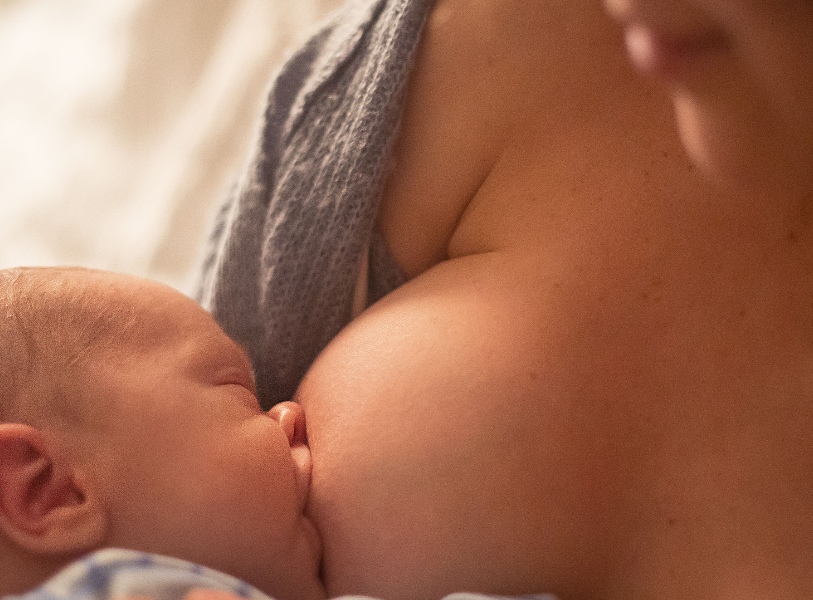Congratulations on becoming a new mom! Breastfeeding can be a rewarding and nourishing experience for both you and your baby. It’s natural to have questions and concerns as you begin breastfeeding, so here is the ultimate guide to breastfeeding for new moms.
- Get comfortable: Find a comfortable position to hold your baby while breastfeeding. This can help you relax and make it easier to latch your baby onto the breast. Some common breastfeeding positions include the cradle hold, the cross-cradle hold, and the football hold. Experiment with different positions to find what works best for you and your baby.
- Pay attention to latch: A good latch is essential for successful breastfeeding. To latch your baby onto the breast, bring your baby close to your body with their nose level with your nipple. Tilt your baby’s head back slightly and gently guide their mouth over your nipple and areola (the darker area around the nipple). A good latch will result in your baby’s mouth covering most of your areola, not just the nipple.
- Know your baby’s hunger cues: It’s important to feed your baby when they are hungry, rather than on a schedule. Some common hunger cues include rooting (when your baby turns their head and opens their mouth when they feel something touch their cheek), sucking on their hands, and making sucking noises.
- Know your own body: Your body will produce milk based on the demand from your baby. The more your baby nurses, the more milk your body will make. It’s normal for your breasts to feel full and engorged in the first few days after your baby is born. As your baby nurses, your breasts will feel softer and less engorged. It’s also normal for your breasts to feel full and engorged again in the evenings, as your body prepares for the next day.
- Pay attention to your baby’s output: It’s important to monitor your baby’s output to ensure they are getting enough milk. In the first few days after birth, your baby should have at least six wet diapers and three or more stools each day. As your baby gets older, the frequency of wet diapers and stools may decrease, but the amount of urine and stool produced should increase.
- Know the signs of a good milk supply: A good milk supply is important for breastfeeding success. Some signs that your baby is getting enough milk include:
- Your baby is nursing frequently and efficiently
- Your baby is gaining weight at a healthy rate
- Your baby is alert and active
- Your baby has plenty of wet and dirty diapers
- Know the signs of a poor milk supply: If you are concerned about your milk supply, look for the following signs:
- Your baby is not gaining weight or is losing weight
- Your baby is fussy and difficult to feed
- Your baby seems hungry all the time
- Your baby is not having enough wet or dirty diapers
If you are experiencing any of these signs, it’s important to talk to a healthcare professional or a lactation consultant. They can help you identify the cause of the problem and provide solutions to increase your milk supply.
- Avoid pacifiers and bottles: Pacifiers and bottles can interfere with breastfeeding by altering your baby’s latch and sucking patterns. If you need to use a pacifier or bottle, wait until breastfeeding is well established (at least the first few weeks) before introducing them.
- Know how to pump: If you need to be away from your baby or if you want to increase your milk supply, pumping can be a useful tool. To pump effectively, make sure you have a good latch on the breast pump, and use a consistent pumping pattern (such as pumping for 20 minutes, then taking a break, then pumping for another 20 minutes). Pumping can help you maintain your milk supply and provide your baby with breast milk when you are not able to breastfeed directly.
- Get support: Breastfeeding can be challenging, and it’s normal to have questions and concerns. Don’t hesitate to seek support from your healthcare provider, a lactation consultant, or a breastfeeding support group. They can provide valuable information and guidance to help you succeed at breastfeeding.
Breastfeeding can be a rewarding and nourishing experience for both you and your baby. With a little practice and support, you can establish a successful breastfeeding relationship with your baby. Remember to be patient and to seek help when you need it. With time and effort, you’ll find a breastfeeding routine that works for you and your baby.




